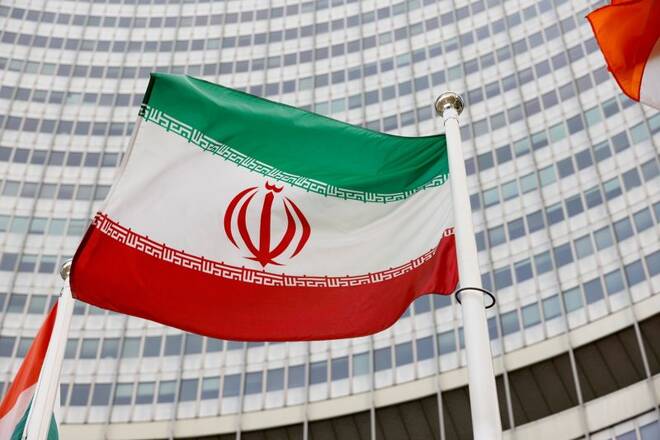Advertisement
Advertisement
Iran nuclear talks resume with upbeat comments despite scepticism
By:
By Francois Murphy and Parisa Hafezi VIENNA (Reuters) - World powers and Iran will gather in Vienna on Monday to try to salvage their 2015 nuclear deal, but with Tehran sticking to its tough stance and Western powers increasingly frustrated, hopes of a breakthrough appear slim.
By Francois Murphy, Parisa Hafezi and John Irish
VIENNA (Reuters) -EU, Iranian and Russian diplomats sounded upbeat as Iran and world powers held their first talks in five months on Monday to try to save their 2015 nuclear deal, despite Tehran taking a tough stance in public that Western powers said would not work.
Diplomats say time is running out to resurrect the pact, which then-U.S. President Donald Trump abandoned in 2018 in a move which infuriated Iran and dismayed the other powers involved – Britain, China, France, Germany and Russia.
European Union, Iranian and Russian delegates to the talks offered optimistic assessments after the new round began with a session of the remaining parties to the deal, without the United States – whom Iran refuses to meet face-to-face.
“I feel extremely positive about what I have seen today,” Enrique Mora, the EU official chairing the talks, said after the meeting – the seventh round of talks aimed at reviving a deal under which Iran limited its disputed uranium enrichment program in return for relief from U.S., EU and U.N. economic sanctions.
Mora told reporters the new Iranian delegation had stuck to its demand that all sanctions be lifted. But he also suggested Tehran had not rejected outright the results of the previous six rounds of talks held between April and June.
“They have accepted that the work done over the first six rounds is a good basis to build our work ahead,” he said. “We will be of course incorporating the new political sensibilities of the new Iranian administration.”
Russia’s envoy to the talks, Mikhail Ulyanov, said on Twitter they “started quite successfully.” Asked he if was optimistic, Iran’s top negotiator, Ali Bagheri Kani, told reporters: “Yes, I am.”
However, it was not clear whether Iran had agreed to resume the talks where they had left off in June – as demanded by Western powers – or that the optimism was justified.
A European diplomat struck a pessimistic note, saying the Iranians stuck to their positions and at times toughened them, which was hardly encouraging.
The diplomat said matters would become clearer when detailed talks on sanctions take place on Tuesday and on nuclear issues on Wednesday.
The meeting in Vienna ended a hiatus triggered by the election in June of Ebrahim Raisi, an anti-Western hardliner. The talks are effectively indirect negotiations between Tehran and Washington, with other officials shuttling between them.
Tehran’s negotiating team has set out demands that U.S. and European diplomats consider unrealistic, Western diplomats say.
Iran has adopted an uncompromising position by demanding the removal of all U.S. and European Union sanctions imposed since 2017, including those unrelated to its nuclear programme, in a verifiable process.
Bagheri Kani also said Washington and its Western allies should guarantee no new sanctions would be imposed in future.
“All parties in the meeting accepted Iran’s demand that first the situation of illegal and unjust U.S. sanctions … should be cleared and then (we) discuss other issues and decide on those issues,” he told reporters.
There was no immediate comment from the big powers on Bagheri Kani’s remarks about the sequencing of topics.
During a telephone call, French President Emmanuel Macron urged Iran’s Raisi “to engage constructively” to permit a quick return to the agreement and to keep Iran’s commitments to the United Nations atomic watchdog, Macron’s office said.
Iran’s conflicts with the International Atomic Energy Agency, which monitors its nuclear programme, have festered.
As Iran has advanced its uranium enrichment, the agency says its inspectors have been treated roughly and refused access to reinstall monitoring cameras at a site it deems essential to reviving the deal.
Since Trump took the United States out of the deal, Iran has breached many of its restrictions meant to lengthen the time it would need to generate enough fissile material for a nuclear bomb Iran says it wants to enrich uranium only for civil uses.
(Reporting by Parisa Hafezi and Francois Murphy in Vienna and by John Irish in Paris; Writing by John Irish, Parisa Hafezi and Arshad Mohammed; Editing by Mark Heinrich and Grant McCool)
About the Author
Reuterscontributor
Reuters, the news and media division of Thomson Reuters, is the world’s largest international multimedia news provider reaching more than one billion people every day. Reuters provides trusted business, financial, national, and international news to professionals via Thomson Reuters desktops, the world's media organizations, and directly to consumers at Reuters.com and via Reuters TV. Learn more about Thomson Reuters products:
Latest news and analysis
Advertisement
